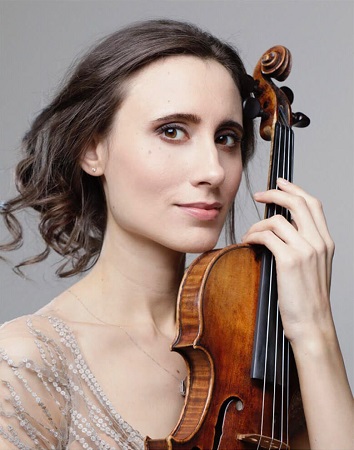 United Kingdom Howard, Elgar, Rózsa: Jennifer Pike (violin), Martin Roscoe (piano). Wigmore Hall, London, 27.1.2020. (CS)
United Kingdom Howard, Elgar, Rózsa: Jennifer Pike (violin), Martin Roscoe (piano). Wigmore Hall, London, 27.1.2020. (CS)

Dani Howard – Dualism (world première)
Edward Elgar – Violin Sonata in E minor Op.82
Miklós Rózsa – Variations on a Hungarian Peasant Song Op.4
Risoluto and con forza are the instructions that Elgar gives at the start of the first movement of his Violin Sonata, and Jennifer Pike certainly took the composer at his word in this lunchtime recital at Wigmore Hall, launching into the plunging, arching phrase which opens the Allegro with an almost angry determination and urgency. Pike and pianist Martin Roscoe had the full measure of Elgar’s restless mood-swings in this movement, and shaped both the dramatic contrasts of character and the more subtle fluctuations of tempo and phrasing with assurance. The incessant tug and pull of tension, climax and release were handled masterfully. A fine balance between the two instruments was sustained.
The duo achieved great intensity, and also, in the strange arpeggio-episode for the violin, captured the music’s ‘mystery’. But, the sonata was composed in 1918, the same year as the Cello Concerto and at times I missed the tenderness and sense of lament that is surely never absent from Elgar’s music: the characteristic poignancy of the second subject, for example. Pike and Roscoe sensibly eschewed sentimentalism but perhaps a little more espressivo at such moments, which combine nobility and pathos, would have added a telling touch of sweet sorrow.
The violin descent at the start of the Andante was eloquent but again quite determined in spirit. I hear the weight of grief within the gravity, a sadness which the music itself tries to shake off through playful wriggling triplet motifs and pizzicato snatches. Elgar is whimsical and unpredictable in this movement, and the performers’ precision was impressive, but the music never quite captured a sense of spontaneity. There was some beautifully expressive playing, however, and once again the structure and climax were persuasively communicated. In the more coquettish passages, the strength and sureness of the violin line was finely complemented by the delicacy of Roscoe’s accompaniment. There was a sense of relaxation at the start of the Allegro non troppo which moved compellingly forward, then held back, then flowed forth once more with an easy naturalness. Elgar, himself a violinist, pushes the violin’s flights higher in this movement and Pike’s E-string melodies were clear and true. The closing episode glowed with a warm exuberance, Pike, so disciplined and focused, allowing herself a smile of pleasure as she swept through the violin’s surging melodies.
The recital had begun with the world premiere of a new composition by Dani Howard, Dualism, which was commissioned by BBC Radio 3. Howard describes the work as embodying a perennial human conflict: ‘between wanting to be hugely ambitious and productive’ and wanting ‘to enjoy life, relax and have fun’. With the violin and piano taking different sides in the debate, Howard effectively balances stillness and dynamism, with movement sometimes stirring unexpectedly from quietude. For example, the piano’s initial circling sparkles suddenly plunged in a crescendoing cascade, drawing the violin into discussion, and though at first Pike’s vibrato-less held notes could not be disturbed, another piano tumble clicked a switch compelling the violin to respond with sharply defined dancing patterns. The music, quasi-minimalist in idiom, was ‘alive’ and playful, though the arguments developed in intensity, the piano delving deep in resonant booms, the violin climbing to the peaks and asserting itself in a climactic cadenza, the virtuosity of which Pike seemed to positively relish. The final bars trickle away into silence, and I’m not sure who won the argument!
The recital concluded with Miklós Rózsa’s Variations on a Hungarian Peasant Song Op.4. This work found Pike at her best, I thought. She’s been a strong advocate for Rózsa’s work, recording both the Violin Concerto and these variations in their orchestral version, for Chandos, and she displayed an innate feeling for the Hungarian-inflected ‘voice’ of the music. Each variation was played with incredible care and nuance in order to capture its individual spirit: nostalgic or forthright, delicate or pugnacious. The unaccompanied violin statement of the theme was beautifully soulful, and then richly harmonised by Roscoe. It takes enormous skill and discipline not just to play Rózsa’s intricacies and fancies with such precision but also to make the music sound so spontaneous and free. Pike and Roscoe danced their way through the spiky pizzicato jauntiness, luxuriated in the melodising and breezed through the rhythmic fun. In the demanding double-stops Pike’s tone was unfailingly warm and she raced through the precipitous passages crisply.
Having whipped up a whirl of passion in Rózsa’s celebration of his homeland, Pike and Roscoe returned to English shores for their encore, calming us once more with a beautifully unaffected and articulate rendition of Elgar’s Salut d’amour.
Claire Seymour